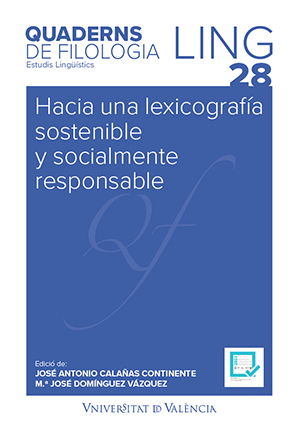Estudi basat en corpus de la neologia semàntica de la pandèmia del COVID-19
DOI:
https://doi.org/10.7203/qf.0.26663Paraules clau:
col·locacions, corpus, lexicografia, metàfora, metonímia, neologia semàntica. Resum
Resum
Aquest article presenta una sèrie d'estudis basats en corpus per a la detecció semiautomatitzada de neologia semàntica als substantius de l'espanyol el 2022, any en què encara existia la pandèmia del COVID-19, però també altres esdeveniments globals importants, com ara la guerra d'Ucraïna o la inflació econòmica. Comparem un corpus de textos del 2022 amb un corpus previ a la pandèmia, considerant quatre tipus de càlcul de freqüència i paraules clau i tenint en compte la combinatòria lèxica dels candidats a neologisme. Els resultats indiquen que la combinació de paraules clau amb textos agrupats segons la temàtica dóna els millors resultats per detectar neologia semàntica.
 Descàrregues
Descàrregues
Descàrregues
Publicades
Com citar
-
Resum762
-
PDF 377
Número
Secció
Llicència
 Este obra está bajo una licencia de Creative Commons Reconocimiento-NoComercial-SinObraDerivada 4.0 Internacional.
Este obra está bajo una licencia de Creative Commons Reconocimiento-NoComercial-SinObraDerivada 4.0 Internacional.
Tots els documents inclosos a OJS són d'accés lliure i propietat dels seus autors i/o institucions editores, i per tant, qualsevol acte de reproducció, comercialització, comunicació pública o transformació total o parcial necessita el consentiment exprés i escrit d'aquests.
Authors who publish with this journal agree to the following terms:
- Authors retain copyright and grant the journal right of first publication with the work simultaneously licensed under a Creative Commons Attribution License that allows others to share the work with an acknowledgement of the work's authorship and initial publication in this journal.
- Authors are able to enter into separate, additional contractual arrangements for the non-exclusive distribution of the journal's published version of the work (e.g., post it to an institutional repository or publish it in a book), with an acknowledgement of its initial publication in this journal.
- Authors are permitted and encouraged to post their work online (e.g., in institutional repositories or on their website) prior to and during the submission process, as it can lead to productive exchanges, as well as earlier and greater citation of published work (See The Effect of Open Access).




